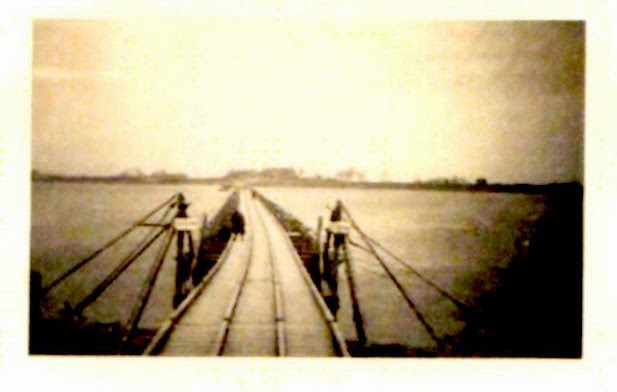Original post date: 6 Jun 2014
Military
Week - 5
Barely out of his teens at age of 20, my father Thomas Ray
Edward “Bud” Seale, along with his brother Bill and their best friend James
(later their brother-in-law), enlisted in the 16th Field Company at
Montreal. After basic training at the camp in Longueuil Bud asked to be
transferred to the 1st Bridge Company of the Royal Canadian Army Service Corps
at Mt Bruno, Qc, because they were the next to be mobilized overseas. He
shipped out of Halifax on Nov 13, 1941 and disembarked at Liverpool on Nov 23,
1941. Once in Europe it was training, training, and more training. Driving,
motorcycles, weapons, Map reading, officer training… the list goes on, with a
few days leave here and there, all through 1942, building bridges in 1943, then
more training into 1944, rising to the rank of Sergeant. This is a
pontoon bridge built across the Rhine.
Early in 1944 Bud asked to be transferred to artillery,
where he was given more training, and in March 1944 was made a Lieutenant
and gun position officer in charge of 35 men.
His friend and fellow officer from Montreal, Charles
Lavallee, is in these photos (middle bottom 2) on leave in Neede, Holland. Bud
is standing in front of windmill that is near his position. The photo of his
gun crew was too small and fuzzy (the photos he had are about 1 ½ inches).
In the early morning of June 6th they got word
that troops were landing on the beaches in Normandy. Bud reported to his
holding unit and was assigned to the 25th Field Regiment, engaged north of
Caen, France. As troop leader he had 4 guns - 25 pounders, and gun
tractors with a cab for 6, ammunition carriers, a jeep, a Sergeant, and a crew
of 6 including a Corporal. They supported the Infantry and the Armor
with shell fire.
In the winter of 44-45 they were bogged down at the Maas
River, and could see the Germans across the river, neither going
anywhere. In May 1945 the Germans surrendered. Bud left England in
November 1945 and he was put on Active Reserve until he was discharged February
20, 1946. Neither my Dad, his brother nor his friend remembered anything about
their homecoming. They had to hash it over with other friends and family and
still no one remembered. He says “Four bloody years fighting for
your country and nobody remembers our coming home!” They finally figured out
that Dad and Bill arrived at Halifax while Jim was shipped home through New
York.
Bud never talked about the war, just one time he told my
mother it was too terrible. Even in is memoirs that he wrote when he was in his
80’s he mostly talked about leave, girls, and touring, with a bit of training
mentioned, and what bits I’ve written above. Nothing of the horrors of war.
Bud went to Loyola College taking advantage of the
government plan to provide education for veterans. As my parents got
up in their 80’s the veterans paid for their house cleaning 2ce monthly,
windows 2ce a year, lawn and snow as needed, driver to doctor appointments,
living aids, anything they needed. They still continued giving these
services to my mother as the widow of a vet.
Relevant
Links:
Books of Remembrance Canada
WWII Ranks and Units – Cda, UK, US, et al
USA WWII Records
British WWII medal records
British Military Records
Ireland Military Services
Australia WWII Nominal Rolls
Military Germany
Polish soldiers who served with the British Forces
Internment Camps Canada
British Navy List - 1944
Canadian Army Newsreels (youTube)














No comments:
Post a Comment
Leave me a note to tell me you were here! Thanks for visiting.